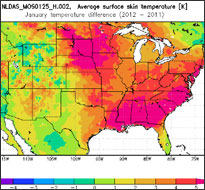A 2012 survey by researchers at Yale University and George Mason University investigates how the American public responds to weather events that deviate from typical patterns. The findings are summarized in a report, “Extreme Weather, Climate and Preparedness in the American Mind,” that seeks to clarify how the public connects changes in annual weather patterns, record-breaking temperatures and extreme storms to the issue of human-induced climate change. Of course, individual weather events may not be directly “caused” by climate change, but the consensus of the world’s scientific community is that such global climate shifts will increase risk, make such events more likely and magnify their strength.
The report notes that in 2011 “Americans experienced a record-breaking 14 weather and climate disasters that each caused $1 billion or more in damages, in total costing approximately $53 billion…. In the period of January through March 2012, Americans also experienced record warm temperatures, with temperatures across the contiguous United States 6.0 degrees F above the long-term average. In March alone, 15,292 warm temperature records were broken across the United States.”
The report’s findings include:
- Slightly more than half of Americans (52%) say that unusual weather events have happened locally; some 62% say this is true nationally.
- “Overall, 82% of Americans report that they personally experienced one or more types of extreme weather or natural disaster in the past year. These include extreme high winds (60%), extreme rainstorms (49%), extreme heat waves (42%), drought (34%), extreme cold temperatures (29%), extreme snowstorms (26%), tornadoes (21%), floods (19%), hurricanes (16%) or wildfires (15%).”
- “About half of all Americans say that heat waves (53%), droughts (46%) and very heavy rain storms (43%) have become more common in their local area over the past few decades.”
- “A large majority of Americans believe that global warming made several high-profile extreme weather events worse, including the unusually warm winter of December 2011 and January 2012 (72%), record high summer temperatures in the U.S. in 2011 (70%), the drought in Texas and Oklahoma in 2011 (69%), record snowfall in the U.S. in 2010 and 2011 (61%), the Mississippi River floods in the spring of 2011 (63%), and Hurricane Irene (59%).”
- Among survey respondents, 69% said they either strongly agreed or somewhat agreed with the idea that global warming is affecting the weather in the United States. Across the country’s regions, the aggregate totals were roughly similar; for example, 71% of people in the Northeast either strongly agreed or somewhat agreed, while a combined 69% did so in the South.
- Half of Americans expect an extreme weather event to cause a natural disaster in their community in the next year, but only 17% report having spent a great deal of time thinking about preparation.
The researchers also note that, though 71% of Americans get their weather news through local television, only “11% report that they have seen a weather forecaster talking about global warming in the past 12 months many times (5 or more), while 20% say they have seen this a few times (3 or 4 times). Yet 58% of Americans would be interested in learning what their favorite TV weathercaster has to say about global warming.”
Tags: global warming, climate politics


Expert Commentary